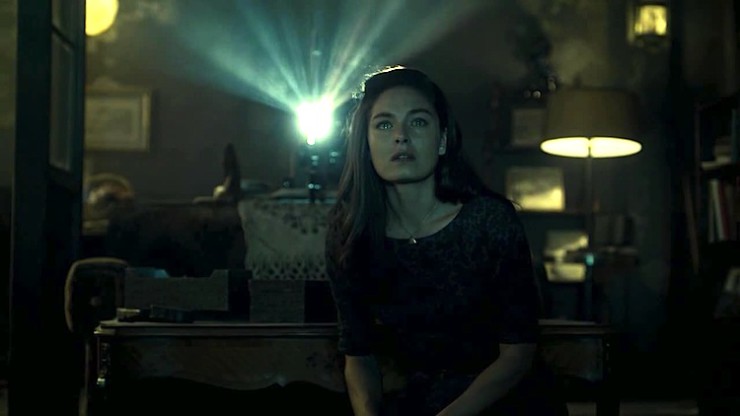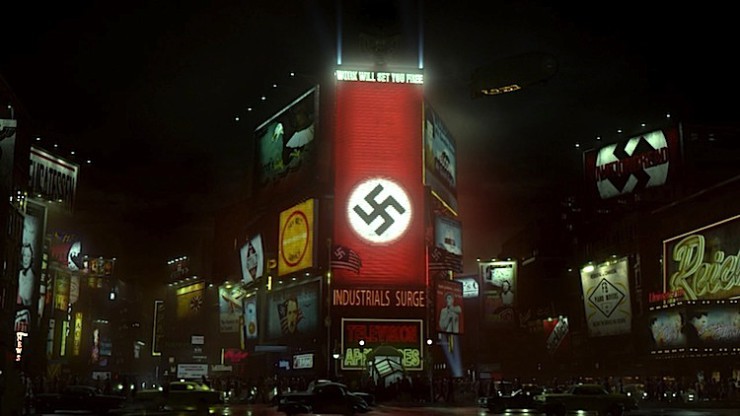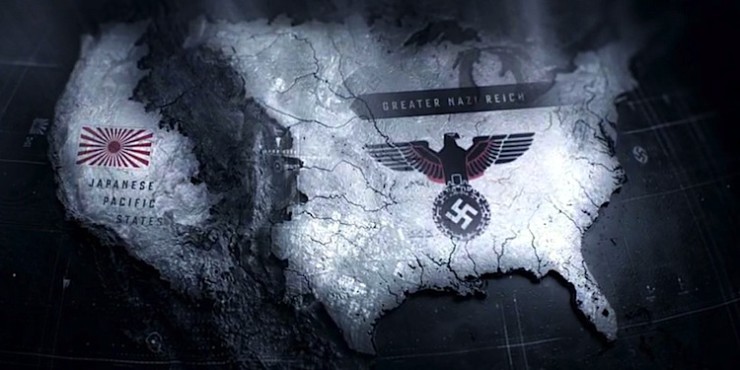I must begin this review with a confession: I’ve never read The Man in the High Castle. I’ve meant to; I’ve owned copy since college, and I’ve taken it off the shelf a dozen times… but the truth is, I’ve been too afraid of the alternate history it creates to let it into my head. So when I went to a New York Comic-Con screening of the pilot and second episode for Frank Spotnitz’ adaptation, I was nervous. It turned out this was justified: the world depicted in the show is harsh, brutal, and deeply horrifying. In a day when I watched the pilot for the new The X-Files miniseries (damn good!) and the pilot for Jessica Jones (Holy. Shit.) The Man in the High Castle easily held its own with an unbearably tense story, shot through with enough humanity and hope that I can’t wait to see where it goes next.
Obviously with only two episodes I can’t speak to how well they’ll pull off an entire arc, but these first two were remarkably taut and engaging (with some fun little PKD Easter eggs scattered throughout). The show’s creation of the alternate timeline is exquisite. For those who also haven’t read the book, here’s a brief, spoiler-free summation: The Allies lost World War II, and the U.S. has been partitioned into three sections. The Greater Nazi Reich rules over the East Coast and Midwest, the West Coast is now collectively called the Japanese Pacific States, and the Rockies fall under an uneasy “Neutral Zone,” which has become a haven for “undesirables.” There are hints that some liberal cultural artifacts from the ‘50s and early 60s have come to rest here, and there is also the possibility of fleeing to South America, but it seems inevitable that the Reich and the Imperialist Army are going to clash again, and the Neutral Zone isn’t going to last too long. We check in with San Francisco, which is now the extremely Japanese capital of the coast, and New York, which, well:
I could be snarky, and say, “Hey! They actually found a way to make Times Square worse!” But if I’m being honest, that image nauseated me so much it took me minute to catch back up with the plot. Almost more upsetting, the town that we visit in the Neutral Zone was filmed in Roslyn, Washington, so any fans of Northern Exposure are in for an extra gutpunch.
Obviously there’s a Resistance—there wouldn’t be much of a show if everyone was living placidly under foreign rule—but the object that the Resistance is trying to smuggle across the country manages to be simultaneously a MacGuffin that transcends its MacGuffin-ness; a commentary on the power of storytelling; and, most impressively, a commentary on the alternate history subgenre itself. Woven through that story of Resistance are the many nuances of life an an occupied people. Each character has to decide how far they can bend, and how much they’re willing to risk, to restore their country. Especially poignant is that, as the story is set in 1962, the U.S. has been occupied for 16 years (in this timeline WWII continued into 1947) so all of the mid- to late-twenty-somethings that we meet have no real memory of life before the war and occupation. They’re literally fighting for a dream. In the same way, the younger characters that we meet have all accepted the ideologies taught to them by their Imperialist and Nazi overlords, because why would they fight them?
Alexa Davalos is utterly luminous as Juliana Crain, who has to decide how far she’s willing to go to try to save her country, and Rupert Evans is sweet and heartbreaking as her boyfriend Frank. Also, Rufus Sewell makes an absolutely chilling Obergruppenführer of the New York branch of the SS. One of the particularly sick parts of the Nazi ideology was the promotion of a model family, ruled by a patriarch and his submissive matriarch, where only the collective matters. There’s a particular scene in the Obergruppenführer’s home that brings this ideology to life and transplants it to Long Island, and the obvious parallels between this and the ideal American family of the 1950s are terrifying. I’ve written in the past about those lifestyle shorts that were gleefully skewered on Mystery Science Theater 3000—this scene mirrors those shorts, except the stern-yet loving Papa wears a swastika on his arm.
Speaking as someone who’s never read the book, the show is shocking and tense, but throws you enough lifelines of human decency that you can make it through. This is also very much a PKD story. When a person is thrown into jail, his subsequent struggle isn’t just to try not to turn informant on someone he cares about – it’s also framed in very Dickian questions about freedom, identity, and the integrity of his soul. The Japanese commander plans much of his policy on the warning of I Ching sticks. Juliana may hate the Imperialist control of her country, but she still loves Japanese culture, and is on her way to becoming an Aikido master. Nazis love their sons, and torturers are quick to point out that they’re not monsters.
I’m pleased I was able to see these first two episodes in a theater setting, as well, because the audience reacted viscerally to each new twist and betrayal. The showrunner, Frank Spotnitz, and castmembers Alexa Davalos, D.J. Qualls, Joel de la Fuente, and Cary-Hiroyuki Tagawa came out before the screening to talk with us a bit about the show. While Davalos spoke most about how much she loved the warmth and strength of Juliana, and Qualls tried to lighten the mood as much as possible with occasional jokes, Spotnitz highlighted the show’s commitment to examining moral truths. He encapsulated the horror of the show with one line: “Gandhi was able to shame the British into leaving India, and Martin Luther King was able to shame the government of this country into desegregation. But you can’t shame Hitler.” It’s a horrifying question, but one which must be asked again and again in this world: How can do you remain human under a regime that doesn’t value humanity?
Having seen the first two episodes, I’m hopeful that this show will continue making thrilling television out of Philip K. Dick’s examination of history. The whole series will be available on Amazon Prime on Friday, November 20th, but if you can’t wait that long, here’s a slightly spoilery trailer, and the first two episodes are available now!
Leah Schnelbach will quietly admit that the Time Square shot up there makes her tear up every time she sees it. Well done, show. Come bug her on Twitter!












